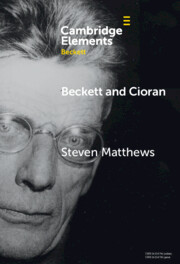Element contents
Beckett and Cioran
Published online by Cambridge University Press: 22 April 2024
Summary
- Type
- Element
- Information
- Series: Elements in Beckett StudiesOnline ISBN: 9781009351560Publisher: Cambridge University PressPrint publication: 16 May 2024



